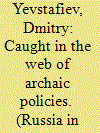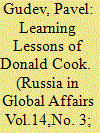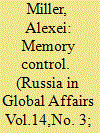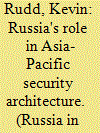|
|
|
Sort Order |
|
|
|
Items / Page
|
|
|
|
|
|
|
| Srl | Item |
| 1 |
ID:
147039


|
|
|
|
|
| Summary/Abstract |
The term 'legitimacy' has a prominent place in Russian political rhetoric. It has been on the lips of the country's policymakers for the past 15 years. Over that period, its interpretation has undergone certain changes, but the core meaning is intact and can be found in all statements on Russia's position. It saw shifts in emphasis now and then though. Initially, it was about the supreme legitimacy of international organizations and legitimacy as people's confidence in politicians and institutions, and later on it was referred to in a narrow legal sense as the legitimacy of the existing institutions. However, the original sense of the word is still valid.
|
|
|
|
|
|
|
|
|
|
|
|
|
|
|
|
| 2 |
ID:
147034


|
|
|
|
|
| Summary/Abstract |
Mesopotamia ("between the rivers" in Greek), the area between the Tigris and the Euphrates rivers and the Levant which embraces the current territories of Syria, Lebanon and Iraq, vividly reveals the contradictions of the modern world. This region has highlighted the immediate consequences of the military conflict and absence of a full-fledged cooperative basis for the key states to maintain strategic interaction. Yet this does not rule out the possibility of certain, albeit limited, cooperation in military operations and in the political and socio-economic reconstruction of the region.
|
|
|
|
|
|
|
|
|
|
|
|
|
|
|
|
| 3 |
ID:
147036


|
|
|
|
|
| Summary/Abstract |
Historically, the activity of different groups of people, societies, and nations has increased and decreased and people have experienced various economic fluctuations. Not only is this taking place today, but it will also reoccur in the future due to various political, technological, social, biological, monetary, and natural factors. No country or economy can avoid it.
|
|
|
|
|
|
|
|
|
|
|
|
|
|
|
|
| 4 |
ID:
147044


|
|
|
|
|
| Summary/Abstract |
The decades-long tug of war on the Korean Peninsula has entered a new and more dangerous round in recent years. North Korea and South Korea both have not recognized the results of the 1950-1953 war and have not made peace. In the 1970s-1980s, North Korea relied on Chinese and Soviet assistance in defending the country, dreaming even of using their assistance in achieving reunification on its own terms. There are no such hopes any more. While some hotheads in Pyongyang may be considering taking over the South using nuclear supremacy, the regime would hardly resort to that. Until recently, tensions on the Korean Peninsula increased and subsided with seasonal regularity. But no one dared to cross the red line as neither side is prepared to start a large war. In fact, there are no goals that could justify such a war.
|
|
|
|
|
|
|
|
|
|
|
|
|
|
|
|
| 5 |
ID:
147032


|
|
|
|
|
| Summary/Abstract |
On April 11 and 12, 2016, the U.S. destroyer USS Donald Cook, armed with dozens of nuclear-capable Tomahawk cruise missiles with a range of up to 2,500 kilometers, was approximately 70 kilometers off the town of Baltiysk, Russia's Kaliningrad Region. This circumstance attracted the attention of Russia's Baltic Fleet Command. The fleet's Su-24 warplanes and Ka-27 helicopter made several low passes over the destroyer in extremely close proximity to the ship. The incident provoked discussions on the legitimacy of these actions at a high diplomatic level.
|
|
|
|
|
|
|
|
|
|
|
|
|
|
|
|
| 6 |
ID:
147033


|
|
|
|
|
| Summary/Abstract |
Russia's military operation in Syria has demonstrated a high level of combat readiness of the Russian Aerospace Forces and positive results of the military reform in general. This issue was discussed in detail in Ruslan Pukhov's article "A Proving Ground of the Future" published in Russia in Global Affairs in March 2016. Media and expert attention to the Aerospace Forces' actions is not surprising as this branch of the Armed Forces plays the main role in the Russian campaign against the radical Islamic State. Yet, equally important is the role played by the Russian Navy. It is interesting to analyze how its actions in Syria characterize the current state of the Russian Navy, especially as it continues its mission in the Eastern Mediterranean amid the partial withdrawal of the Russian force from Syria.
|
|
|
|
|
|
|
|
|
|
|
|
|
|
|
|
| 7 |
ID:
147035


|
|
|
|
|
| Summary/Abstract |
Tehran's official position on Russian military involvement in the Syrian civil war was absolutely positive. The mainstream news agencies, such as IRNA, ISNA, ILNA, and Mehr highlighted the bombing campaign favorably, playing up to Russian propaganda. A majority of Iranian officials hailed Russia's joining the fight against ISIS, too.
|
|
|
|
|
|
|
|
|
|
|
|
|
|
|
|
| 8 |
ID:
147040


|
|
|
|
|
| Summary/Abstract |
The world order established in Yalta and Potsdam is gone. We are witnessing global changes that are clearly fundamental but hard to predict. Political transformations are accompanied by major shifts in collective memory. While after World War II most Frenchmen and Germans thought that the Red Army had played the main role in defeating the Nazis, now many of them believe it was the United States. The most pompous parade marking the victory over Nazi Germany in World War II took place in 2015 in Beijing, not in Moscow. Conflicts over the interpretation of the past have become so acute worldwide that a new term, 'memory wars,' has come into use.
|
|
|
|
|
|
|
|
|
|
|
|
|
|
|
|
| 9 |
ID:
147030


|
|
|
|
|
| Summary/Abstract |
Life is never dull. The results of the British referendum, hardly expected by anyone, came as a new wake-up call clearly signaling that there is not a place left on Earth where politics could be predictable. Now everyone is waiting with bated breath for the outcome of the presidential election in the United States where all think that Donald Trump simply cannot win, but are no longer certain.
|
|
|
|
|
|
|
|
|
|
|
|
|
|
|
|
| 10 |
ID:
147042


|
|
|
|
|
| Summary/Abstract |
Observers in the West tend to underestimate the solid foundation of the current Chinese-Russian relationship. The intimacy between Beijing and Moscow is often referred to as a "marriage of convenience." Both Beijing and Moscow, however, rank their ties as the "peak" in mutual history. We can look at this unprecedented phenomenon through two analytical frameworks: the conceptual framework of converging visions of the future world order and the effective operational framework of harmonized national interests.
|
|
|
|
|
|
|
|
|
|
|
|
|
|
|
|
| 11 |
ID:
147043


|
|
|
|
|
| Summary/Abstract |
In June, at a diplomatic gathering in Bangkok, the question was asked whether the OSCE was an appropriate model for security cooperation in Asia. The OSCE Asian conference, attended by Russian, Western and Asian diplomats, was a rare occasion to consider the future of Asian security architecture, drawing on European experience.
|
|
|
|
|
|
|
|
|
|
|
|
|
|
|
|
| 12 |
ID:
147041


|
|
|
|
|
| Summary/Abstract |
With a delay of three years, Russia appears to once again follow the U.S. example and is now "pivoting" to Asia, which, in essence, means a turn to China, whose rise is changing the overall balance in the region and beyond.
|
|
|
|
|
|
|
|
|
|
|
|
|
|
|
|
| 13 |
ID:
147037


|
|
|
|
|
| Summary/Abstract |
The Chinese economy is slowing down. According to official statistics, Chinas GDP grew by 6.9 percent in 2015. This is a very good result given the slow growth of the global economy. Yet this is much below Chinas growth rate of several years ago.
|
|
|
|
|
|
|
|
|
|
|
|
|
|
|
|
| 14 |
ID:
147038


|
|
|
|
|
| Summary/Abstract |
In early May, a week apart, Russia's Minister of Agriculture Alexander Tkachev and presidential economic advisor Sergei Glazyev spoke of exporting Russian fresh water. The minister came out with a radical proposal to export surplus water from hydroelectric power plants in the Altai region to Chinas Xinjiang via Kazakhstan. Glazyev took a more market-oriented approach. He proposed "collecting, purifying, treating and exporting fresh water." In former years, Moscow's ex-mayor Yuri Luzhkov also proposed exporting Russia's water resources, and in 2013 the Economic Development Ministry considered the idea, too. Now this idea has emerged in a different context, but its essence is the same--to get a lot of money without making much effort by selling natural resources that cost nothing to the country.
|
|
|
|
|
|
|
|
|
|
|
|
|
|
|
|
| 15 |
ID:
147031


|
|
|
|
|
| Summary/Abstract |
Until recently the international environment reflected a relative calm among major powers as the numerous proxy wars of the Cold War period had largely gone silent. The number of armed conflicts between regional powers decreased and great powers no longer fought each other. Even though military conflicts continue to be a pervasive feature of the international security landscape, interstate violence has declined sharply since the end of the Cold War, while the number of intra-state conflicts keeps growing.
|
|
|
|
|
|
|
|
|
|
|
|
|
|
|
|
|
|
|
|
|